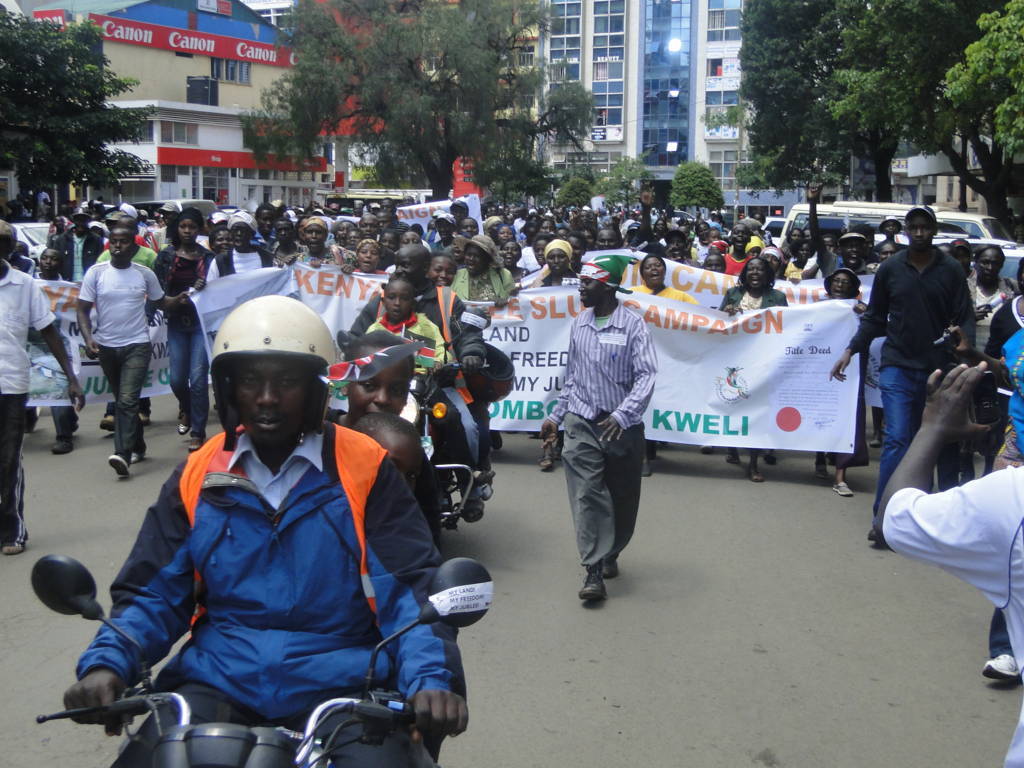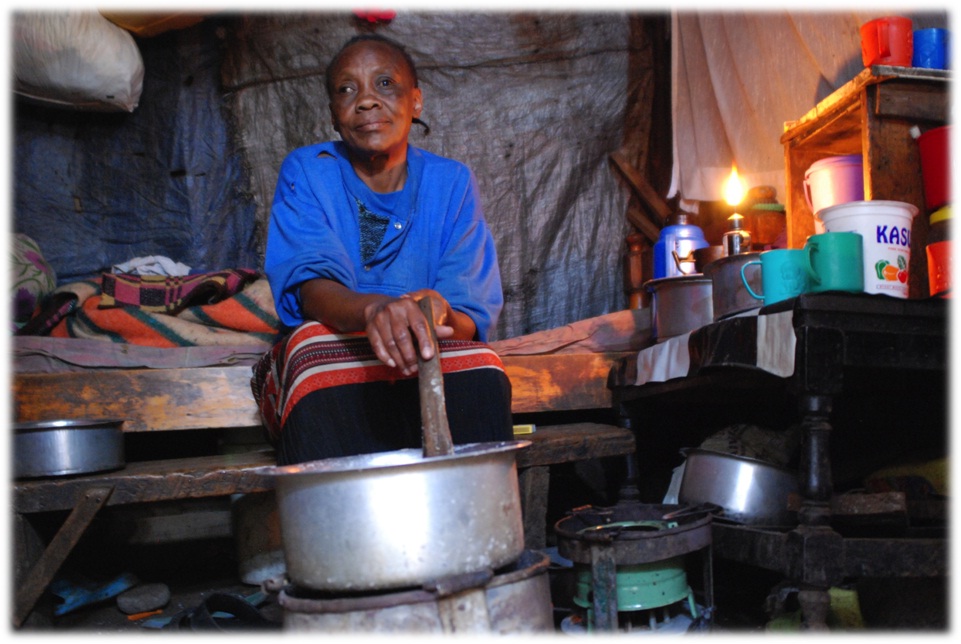The Kenya Jubilee Slum Campaign March-2012
By Nyasani Mbaka
The Year of Jubilee for Slum Dwellers
The Biblical formulation of the jubilee principle denotes: "and thou shalt number seven sabbaths of years unto thee, seven times seven years; and the space of seven sabbaths of years shall be unto thee nine and forty years. Then shalt thou cause the horn (Vuvuzela) of the jubilee to sound on the tenth day of the seventh month, in the day of atonement shall ye make the horn sound throughout your land. And ye shall hallow the fiftieth year, and proclaim liberty throughout the land unto all its inhabitants; and ye shall return every man unto his possession, and ye shall return every man unto his family" [Leviticus 25, 810]".
If a person was obliged to sell his land to pay off a debt, and could not manage to regain possession of it - in the jubilee year his land would be restituted free of charge (A call by Muungano wa Wanavijiji to the land owners and Kenyan Government, on lands occupied by slum dwellers). The same goes for a house, (except for a dwelling house in a walled city). Likewise, "if thy brother... be impoverished, and be sold to thee; thou shalt not compel him to serve thee as a slave: but as a hired servant and as a resident laborer he shall be with thee, and shall serve thee unto the year of jubilee: and then he shall depart from thee, he and his children with him, and shall return unto his own family, and unto the possession of his fathers shall he return."
This is the Point!
Nevertheless, Muungano wa Wanavijiji in conjunction with other actors such as Akiba Mashinani Trust, and a coalition of churches have dared to thrust and capitalize on the reformist thinking, with the aim of securing the future of the current and subsequent generations, where secure of land tenure and basic infrastructure that would help slum dwellers in Kenya gain access to better and cheap housing. In fact, the Kenya slum Jubilee Campaign March 2012(Held on 8.12.12) ,graced by over 10,000 slum dwellers from more than 12 towns in the country was indeed an attempt to institutionalize periodic social upheavals.
The most conspicuous difference between the biblical revolution and socialist revolutions is that the latter are supposed to occur once and for all, while the jubilee revolution should occur at regular intervals. According to plans based on the socialist ideal, a just distribution of land especially to communities living in slums (and measures of social justice in general). According to the Biblical plan, economic life will preserve after the jubilee full liberty from abject poverty for further changes.
However, one area of concern that would be left to the charisma of mother nature, to this kind of social change pioneered by Muungano wa Wanavijiji, to affect change in the slums; is that people will continue to make projects, to scheme, to struggle and compete; some will become rich, some will become poor; life will keep the character of an arena in which it is possible to lose or win, show initiative and fail or succeed.
The true hope of the Kenya Jubilee Slum campaign is that the Jubilee axe sweeps once in a while like a storm over the forest of humanity, and cuts down those treetops which have grown above the average; debts are cancelled, the impoverished regains his property, the slave goes free. Balance is restored, and the economic game starts over again, until the next upheaval when gains of this initiative shall me accounted for.
Last week (8th December 2013) slum dwellers from over 14 towns in the country attended the Kenya Jubilee Slum Campaign march at the historic Jevanjee Gardens in Nairobi. Next year Kenya will mark 50 years since gaining Independence in 1963, the aim of the slum march was basically to consider the biblical principles of Jubilee and enumerate what could possibly be done to give Nairobi’s urban poor dwellers something to really celebrate and smile about in the Jubilee year.
It is out of this sheer reason that over 10,000 slum dwellers from 14 towns in Kenya took to the street to peacefully march in the streets of Nairobi to express their dissatisfaction of policies related to secure tenure and housing. The communities simultaneously entered the city through the five gates of the city, which were; Waiyaki Way, Mombasa Road, Juja Road, Ngong Road and Jogoo Road. Slum dwellers were jubilant and excited by the Jubilee march which was organized to blow the Jubilee trumpets in readiness for restitution, donning colorful attires reflecting the colors of the National flag.
The intention of the whole Kenya Jubilee Slum Campaign is to literally prevent families living in our slum environments from viciously getting trapped in a perpetual cycle of poverty and to ensure that large tracts of land owned by a few while the majority became landless tenants and even slaves. In the course of 50 years perhaps a family would fall on hard times, perhaps they would be forced to sell their land or even themselves as slaves to the rich. But now with the revolution that the Kenya Slum Jubilee Is pitching would like to see a scenario where each family has hope that in the Jubilee year they would be released from slavery and could return to their land, the main means of income guaranteed by a government that is keen to the needs of the poor.
In Mukuru belt slums, every single day we see families getting trapped in cycles of poverty, household heads end up raising their kids and grand-kids in the slum, and poverty is passed on from generation to generation. Nairobi is considered to be one of the world’s most unequal cities, where successive governments since independence have periodically ignored the plight of the poor by addressing policies that would empower the poor to come out of poverty. Picture this scenario; A family residing in the leafy suburbs of Muthaiga (apparently Muthaiga boarders Mathare Valley and are held apart from each other by the million dollar road project, Thika Super Highway) and Karen, where an average family 5 persons live on a 5 acre piece of land while in Kibera/Mukuru/Korogocho/ a family of 8 to 10 live in one 10×10 foot room.
The problem of homelessness and establishment of slums in Kenya and many other cities around the world defies generalization, essentially because the growth of every city and the way the authorities attempt to manage its growth are rooted in its history, culture, as well as its local politics. It is for this reason that through the Jubilee Mission that Slum Dwellers are appealing to its political class to address the issue of inadequate housing. As the limitations of public housing policies in Kenya become evident, the government has continued to exercise laxity in investing in upgrading of slums and squatter settlements, leaving its role to multinational agencies such as the World Bank. In most developing nations governments often contribute to slum growth by failing to provide for the needs of the poor and incorporate them into urban planning. Some governments simply cannot respond to rapid urbanisation quickly enough or lack the tools to deal with the situation. Others take a hostile approach to urbanisation, believing that providing services to the poor will attract more people and cause slums to grow.
Many people do not realize just how big an issue sanitation — or lack thereof — is especially in urban slum areas. Muungano wa Wanavijiji seeks to advocate for an optimum sanitation solution that is sustainable to the urban poor. Whenever Dorcas Moseti and her family must use the bathroom it is always an anxious moment. For the middle-aged lady, options in Mukuru Kwa Njenga settlement are limited. During the day, there are long queues for latrines that cost Ksh5 to use which to a common slum dwellers is not sustainable. At night, her family must relieve themselves in a plastic bag to be disposed of as a “flying toilet,” early the next morning.
There are about 200 different slums and informal settlements in Nairobi with each community living in these settlements having its own unique history of how they ended up in the slums. The driving force of communities behind the Kenya Jubilee Slum Campaign have considered how the principles behind the biblical Jubilee can be well applied in Kenya today to achieve land rights for the urban poor, perhaps not land-ownership but at least security of tenure that families would not need to fear bull-dozers coming in the dead of the night to destroy their homes and communities that they have struggled so hard to build. The other aspect of the campaign is to find sustainable ways of how families can find a secure means of income, since many people living in informal settlements are casual laborers. In Nairobi, the capital city, 60 per cent of the population lives in slums and levels of inequality are dangerously high, with negative implications for both human security and economic development.
Feelings of insecurity in many of the city’s informal settlements have heightened considerably since the violence following the contested election results of December 2007. Poverty in the city is worst amongst those with low levels of education, another cause for concern given that considerably fewer children attend the later stages of school in Nairobi than in Kenya’s rural areas, and many slum areas have few or no public schools. Meanwhile gender inequalities remain severe, with female slum-dwellers being 5 times more likely to be unemployed than males.
This Journey that slum dwellers in Nairobi and other towns have unanimously decided to embark is not easy let alone some of the complex issues that require the undivided attention of various actors to work together to achieve real change, but it is clear that both the local churches supporting this quest and NGOs supporting the basic human rights of the poor need to engage with these issues and seek ways to ensure the voice of the urban poor is not ignored but amplified in creative and constructive ways. Major activities are also lined up for 2013 as Kenya marks its 50th symbolic year, the year of Jubilee. Slum dwellers in Kenya have also been encouraged to register as voters in order for them to speak with one voice to elect leaders who are keen on the plight of the urban poor especially in the capital.








